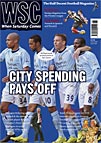 The art of the programme is alive and well in the lower echelons. Owen Amos flicks through the pages
The art of the programme is alive and well in the lower echelons. Owen Amos flicks through the pages
Once, football clubs had programmes. Now, they have matchday magazines. They have shiny covers and shameless names: Blue Review, Red Watch, or worse. They are, they stress, official – as if, somewhere, there’s a thriving market in knock-off Southend United matchday magazines. And, of course, cliche wafts into every corner, like smoke in a taxi. Worst of all, they cost £3.